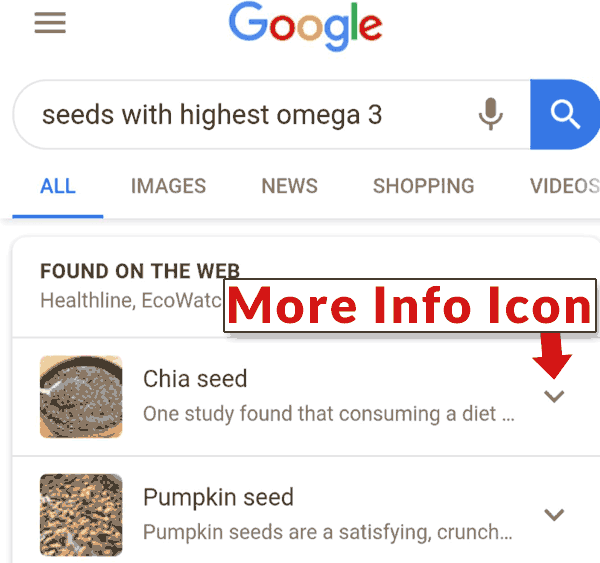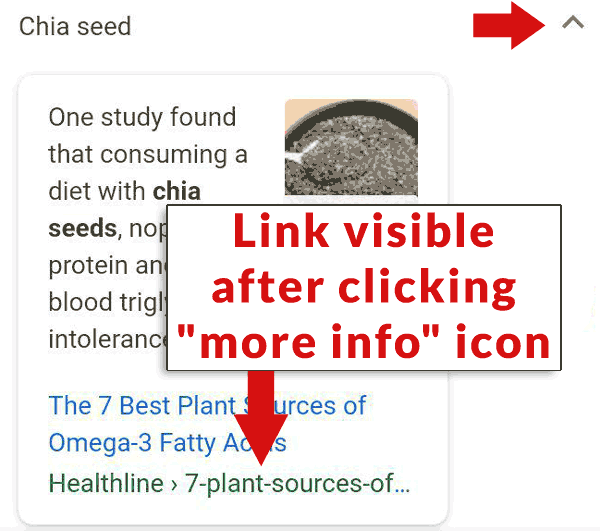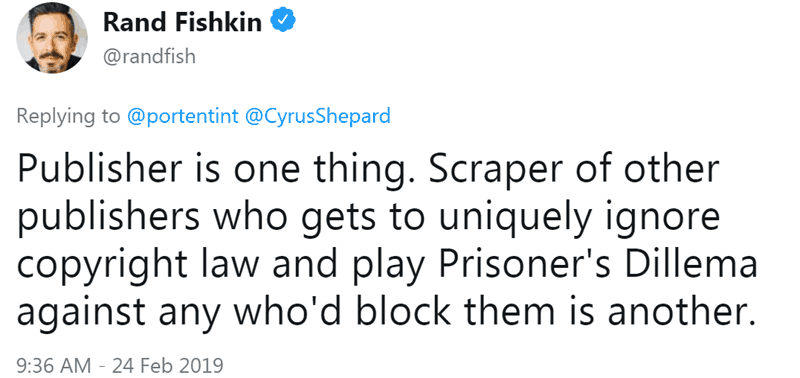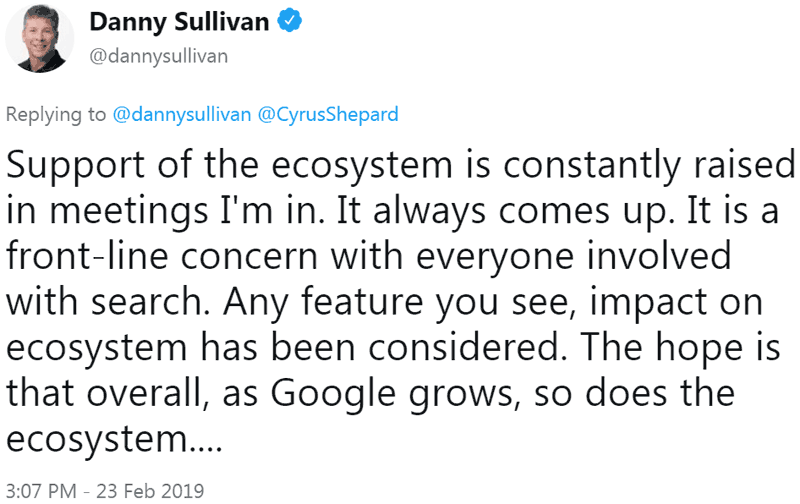Search marketing consultant Cyrus Shepherd tweeted about a featured snippet with zero links back to the websites from which the information came from. The SEO community responded with comparisons of Google to scrapers. Overall, the response was less than positive. Google’s Danny Sullivan responded with an explanation of Google’s position on these kinds of featured snippets.
 Cyrus Shepherd tweeted about a featured snippet that contained no links back to the websites from which the information originated.
Cyrus Shepherd tweeted about a featured snippet that contained no links back to the websites from which the information originated.Unlinked Featured Snippets
In these kinds of featured snippets, Google makes it difficult to click through to the site from where Google indexed the information.
The unlinked featured snippet displays a small triangular icon that has no label to identify what it is for.
 The unlinked featured snippets are visible in mobile. They feature an unlabeled “more info” icon that, when clicked, reveals a link to the website from which the helpful information and images originated.
The unlinked featured snippets are visible in mobile. They feature an unlabeled “more info” icon that, when clicked, reveals a link to the website from which the helpful information and images originated.Once clicked, the website information becomes visible. The icon is small and not everyone may understand that it represents “more information.”
 This screenshot shows what happens after the unlabeled “more info” icon is clicked. The full website link attribution is shown.
This screenshot shows what happens after the unlabeled “more info” icon is clicked. The full website link attribution is shown.SEOs contributed observations, with Ian Lurie of Portent tweeting that this is evidence of Google’s transformation into a publisher.
“I’ve said it before: Google is becoming a publisher. If you’re a competing publisher, I suggest diversifying into fast food franchises.”
Rand Fishkin tweeted an indirect comparison of Google to a scraper:
“Publisher is one thing. Scraper of other publishers who gets to uniquely ignore copyright law and play Prisoner’s Dillema against any who’d block them is another.”
 Rand Fishkin brought up the image of a scraper that violates copyrights. The tweet does not directly call Google a scraper.
Rand Fishkin brought up the image of a scraper that violates copyrights. The tweet does not directly call Google a scraper.Another Twitter member tweeted that it was the death of web publishers:
“This is the death of publishers as Google scrapes all their content and no one visits their sites.”
Danny Sullivan Affirms Google’s Commitment to Publishers
That’s when Google’s Danny Sullivan stepped to give a strong affirmation that Google in fact cares about the publisher ecosystem and that this is a major concern for Google.
Here is what Danny Sullivan tweeted:
Since I got asked about this, a couple of things.
Most important, the future of Google Search is to continue supporting the ecosystem. We don’t thrive & users don’t thrive unless the ecosystem thrives.
I wrote about this last year….
https://t.co/S7Es57l7fW
Danny then followed up by giving an inside look at how the concern over sustaining the publisher “ecosystem” is a top priority in meetings he has attended.
Support of the ecosystem is constantly raised in meetings I’m in. It always comes up. It is a front-line concern with everyone involved with search. Any feature you see, impact on ecosystem has been considered. The hope is that overall, as Google grows, so does the ecosystem….
 Google’s Danny Sullivan affirmed Google’s commitment to a healthy publisher ecosystem. This makes sense because Google cannot function if web publishers aren’t thriving.
Google’s Danny Sullivan affirmed Google’s commitment to a healthy publisher ecosystem. This makes sense because Google cannot function if web publishers aren’t thriving.Danny Sullivan then tweeted that search is always evolving and encouraged SEOs to view these as opportunities and not obstacles.
For everyone to grow, search has to keep evolving. While I think SEOs are fair to raise concerns about new formats, I also think they should recognize that new formats bring in new and often welcomed opportunities. Which leads back to this particular feature….
A feisty discussion continued, with a Twitter member noting there was no attribution or link and compared unlinked featured snippets to plagiarism.
“If I take the copy of a webpage and serve it up without attribution that’s plagiarism. If Google does it that’s “supporting the ecosystem””
“I will pass along the concern that it might be better if these showed a link for the first site being quoted or perhaps the carousel was opened for the first listing.”
That response received generally positive feedback, with this tweet by Thom Craver being representative of the general mood:
“That would be ideal. Google has always wanted sites to link out to sources to help the user experience. SEO’s linked out because it was right for the users (leading to a LOT of nofollow links). Google should certainly follow the guidance they gave us all years ago.”
Why the SEO Community is Upset over Unlinked Featured Snippets
There is a perception that Google encourages publishers to create quality content then uses it without proper attribution. There is also an extremist point of view that Google wants to force publishers to advertise in Google AdWords in order to buy visibility.
The point of view that Google wants to force publishers into paying for clicks is naive. It is naive because it ignores the voluminous historical evidence that Google has consistently supported web publishers. The fact that there are liaisons between Google and publishers is evidence that Google understands that Google’s stability depends on the vitality of the publishing community.
Read the Twitter discussion here.
Screenshots by Author, Modified by Author
Subscribe to SEJ
Get our daily newsletter from SEJ’s Founder Loren Baker about the latest news in the industry!
